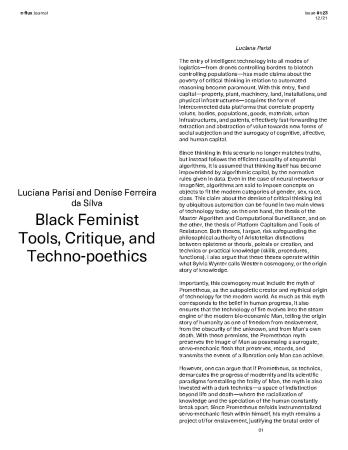▩ Uncomputable One
◈ Black Feminist Tools, Critique, and Techno-poethics by Luciana Parisi and Denise Ferreira da Silva
Type: Journal Article
Description
The entry of intelligent technology into all modes of logistics—from drones controlling borders to biotech controlling populations—has made claims about the poverty of critical thinking in relation to automated reasoning become paramount. With this entry, fixed capital—property, plant, machinery, land, installations, and physical infrastructures—acquires the form of interconnected data platforms that correlate property values, bodies, populations, goods, materials, urban infrastructures, and patents, effectively fast-forwarding the extraction and abstraction of value towards new forms of social subjection and the surrogacy of cognitive, affective, and human capital. Since thinking in this scenario no longer matches truths, but instead follows the efficient causality of sequential algorithms, it is assumed that thinking itself has become impoverished by algorithmic capital, by the normative rules given in data. Even in the case of neural networks or ImageNet, algorithms are said to impose concepts on objects to fit the modern categories of gender, sex, race, class. This claim about the demise of critical thinking led by ubiquitous automation can be found in two main views of technology today; on the one hand, the thesis of the Master Algorithm and Computational Surveillance, and on the other, the thesis of Platform Capitalism and Tools of Resistance. Both theses, I argue, risk safeguarding the philosophical authority of Aristotelian distinctions between episteme or theoria, poiesis or creation, and technics or practical knowledge (skills, procedures, functions). I also argue that these theses operate within what Sylvia Wynter calls Western cosmogony, or the origin story of knowledge.
